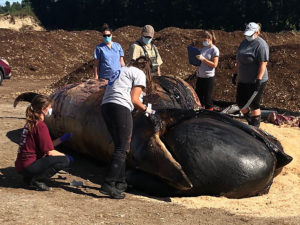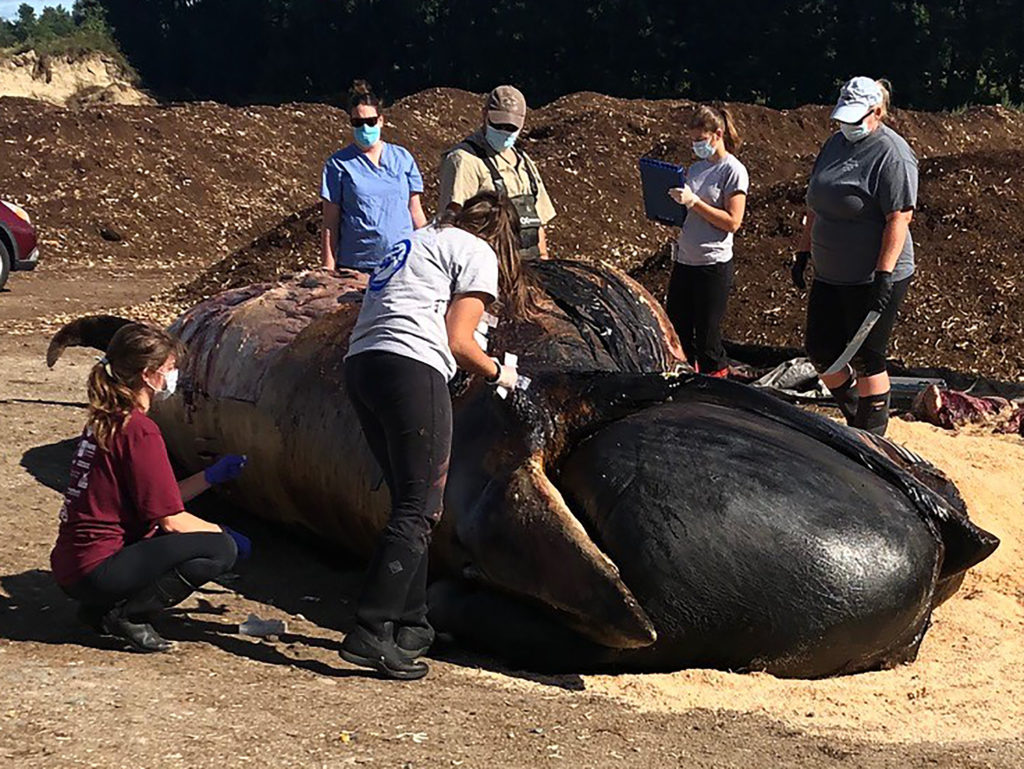
Whale dissected and composted in Gorham

GORHAM – A dead minke whale recently pulled from the waters of Saco Bay was dissected to learn the cause of death and is now being composted, with the finished result used for fertilizer.
Found off-shore from Scarborough, the whale was brought to Benson Farm Earth Products on Plummer Road in Gorham, a former dairy farm that now specializes in composting ingredients from farm, forest, field, and ocean sources to create fertilizer to be used by local gardeners and farmers.
Lynda Doughty, Founding Executive Director of Marine Mammals of Maine (MMoMe), said her group received an initial report on Saturday, August 22, of a whale floating off Stratton Island, which sits in the middle of Saco Bay, east of Old Orchard Beach and south of Scarborough. By Sunday, the whale had landed on the shore of Bluff Island, a smaller island just northwest of Stratton Island.
“We responded to the animal on Sunday, and got to confirm species, some photographs, kind of determine some metrics and get some length measurements, and get some skin samples, some blubber samples off the animal,” Doughty said.
“And then, because of the condition of the animal, we started making plans to bring the animal in for a necropsy,” she said. A necropsy (KNEE-crop-see) is similar to the autopsies performed on humans, where a body is examined to determine the cause of death or the extent of disease.
The National Marine Fisheries Service (NMFS), informally known as NOAA Fisheries, has previously declared an “Unusual Mortality Event” for minke whales, noting on its website that, “Since January 2017, elevated minke whale (Balaenoptera acutorostrata) mortalities have occurred along the Atlantic coast from Maine through South Carolina.”
Doughty said her organization spent the following Monday planning for transport of the whale to a site where the necropsy could be performed, and then had the whale towed to the main shore and transported to Benson Farm Earth Products in Gorham for the actual necropsy. The whale was transported on a flatbed trailer, towed by a pickup truck driven by Benson Farm owner Eddie Benson,
MMoMe was founded in 2011 by Doughty and other volunteers to respond to stranded to marine mammals in southern and midcoast Maine, after the Maine Department of Marine Resources was no longer able to do so with the loss of federal funding. It is the only organization in this part of Maine that has federal authorization for these responses.
The whale was then laid out on the grounds of the farm for the necropsy. “Because of the size of the animal, there’s no place for us to bring it for an inside location,” Doughty said. “And this way, if we needed heavy equipment to move the animal in certain positions, the equipment is there for Eddie to help us do that.”
Determining the cause of death for this whale “is tough, because sometimes you don’t know the decomposition inside, as the air temperature and water temperature heats up while its out floating in the water, the gasses really start to build up inside. So, sometimes we don’t know until we get further into the body cavity, the level of decomposition that is going on,” she said.
For this minke whale, “some of the tissues were too decomposed to sample,” so a final determination of the cause of death may not be possible, she said. “We did take some samples, and we will send those samples that we can . . . but that might not tell the clear whole picture of the puzzle, once we get all the information back.”
Doughty said this appears to have been a mature adult minke whale, about 22 feet long and weighing between 5,000 and 6,000 pounds. Minke whales are the smallest of the “great whales” or rorquals, and are members of the baleen whale family. The minke whale population status is considered stable, so it is not listed as endangered or threatened, but is still protected under the Marine Mammal Protection Act. The minke population may have been reduced to half its original numbers by commercial whaling in the western North Pacific and eastern North Atlantic oceans.
The cause of death of a whale, “does depend on the particular animal. There is currently an unusual mortality rate for large whales in the northeast region” that has been on-doing since 2016-2017, she said. “So it’s kind of an open investigation for large whale cases for humpbacks, minkes and right whales up and down the east coast.”
Doughty said that deaths of large whales normally occur during the warmer months. “We do get probably two to three cases a year” of whale deaths in Maine, she said. “We do treat each one kind of as a way to gain more valuable and scientific information to what may be going on.”
Although no definite reason for the increased deaths has been found, minke and other whales are threatened by whaling, entanglement in fishing gear, ocean noise, habitat disturbance and vessel strikes, according to NOAA Fisheries.
During the necropsy, Doughty had help with the sampling process from Tristan Burgess, BVSC PHD, a veterinarian with Acadia Wildlife Services. Also helping were Dominique Walk, assistant stranding director for MMoMe; Katie Gilbert, a volunteer; and interns Lexi Right and Madison Roberts.
The MMoMe team cut through the skin and blubber to reach the internal organs of the whale. They took samples of the various parts of the animal. “Because the blubber is so heavy, you have to kind of cut it down in certain sections” to reach the inside, Doughty said. “Once we peel back the skin and muscle, then we kind of look at everything before we start to sample, and kind of see where everything is situated and take photographs.” The process is documented piece by piece.
For disease testing for some of the major organs that are viable, the team will look for bacterial or viral infections and take culture swabs of certain areas. They also look at the skin and muscles for any inflammation. “We look at everything from outside in, to see if there are any patterns at all” that would indicate the cause of death, she said. They take blubber samples and muscles samples, as well, and getting results back from the lab “could take months.”
Composting
Benson said his compositing facility in Gorham is licensed by the Maine Department of Environmental Protection to accept fish waste. “We kind of met up with Linda . . . through Maine DEP,” when she was looking for a place she could take deceased marine animals such as whales to perform necropsies on them.
Benson Farm composts the carcasses when Doughty has finished her procedures. The whales are a protected species, so MMoMe collects the bones after the composting process completes. Benson said he provides his service as a donation to the organization.
While the composting process is similar to that found in the traditional garden compost pile or pit in the backyard of some gardeners, Benson said he uses a more scientific process. He adds “the right amount of carbon, nitrogen, air and moisture to make it get as hot as it possibility can, to make it compost in the shortest time possible.” Temperatures are maintained from 125-155 degrees Fahrenheit to speed the process.
Depending on the weather and the size of the carcass, the composting process could take as much as three months. The compost from whales and other endangered species is kept separate from the farm’s commercial compost blends, and instead is donated to local municipal and non-profit organizations.
Composting is as old as civilization, Benson said. It is “the oldest science probably in the world, since the oldest species has been decomposing. So it’s not new science!”
The farm has facilities for MMoMe team members to clean up after a necropsy.




